Developed Innovative Training Formats within DuALPlus
Six partners developed regional training formats based on previous research, either by improving existing trainings or by developing new ones. The trainings are directed at SMEs, trainers or youngsters. They will help these target groups to develop the skills to cope with continuous social, technological and organizational changes in the workplace. The trainings will also help the SMEs to reach out to new target groups like girls, NEETS, refugees, etc. Due to the COVID-19 pandemic, single trainings have been only partly implemented and evaluated so far.
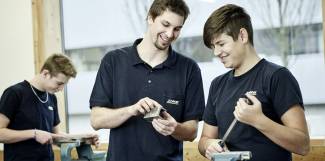
Involved partner regions
In the following, we will introduce the seven training formats developed in Vorarlberg (AT) by Regional Development Vorarlberg eGen, in Lower Austria (AT) by New Design University, in Bavaria (D) by the Chamber of Trade and Crafts for Munich and Upper Bavaria, in Trento (IT) by the Autonomous Province of Trento, in Bolzano (IT) by lvh-Education and Service co-operation and in Auvergne-Rhône-Alpes (FR) by the Auvergne-Rhône-Alpes Regional Chamber of Crafts.
Learning for Life – holistic training concept for apprentices (Vorarlberg/AT)
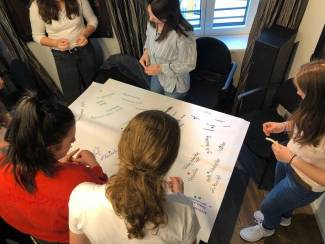
Original photo: (c)WIGE Montafon
Under the motto "Learning for Life" in the Montafon (Vorarlberg, Austria), a holistic and innovative training concept for apprentices has being developed in the course of the DuALPlus project and integrated in the form of a pilot project in spring 2021 into the existing programme as a third pillar. In addition to training in the company and in the vocational school, a regional co-operation project of SMEs will primarily strengthen the expertise, social competences and self-competences of young people. In addition to increasing the attractiveness of dual education, the focus is on the personality formation of the participants. With the aim of lifelong learning and on the basis of the Austrian education system, trainees in general as well as each individual can be shown educational and career paths.
The aim is to implement a cooperative development and education concept for training companies as a third pillar alongside workplace learning and attending vocational schools in autumn 2021, based on the experience of the pilot project in the Montafon.
The participants of the holistic development and education concept are shown, above all, that they are each responsible for their further professional and private development. The education system is open to individual development steps of each individual.
Skilled Training for University Students (Lower Austria/AT)
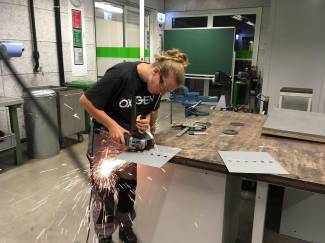
Original photo: (c)New Design University
Linking design and crafts, the “Manual & Material Culture” bachelor’s programme at New Design University (NDU) in St. Pölten aims to prepare students for self-employment in design or crafts or leading positions in medium-sized companies or design offices. Two additional practical courses are offered as part of the course of study (metal and wood), which, however, cannot replace sound teaching for persons without corresponding practical training. The "Skilled Training for University Students" course, developed in collaboration with co-operation partners, is designed as a consecutive model to enable students to complete a skilled worker qualification which was not possible within the framework of the previous metal course of the bachelor’s programme. The combination of university studies and apprenticeship certification contributes to the quality and attractiveness of dual education as well as of the bachelor’s programme.
The pilot model was developed in the second half of 2019 and implemented within the framework of fourteen theory and 18 practice units between March and August 2020. The free course was initially supposed to end between 29 June and 3 July 2020 with the final apprenticeship examination of the participants. Due to the COVID-19 pandemic, the NDU’s teaching activities were shifted to distance or hybrid learning in 2020. Due to the pandemic, the final apprenticeship examination had to be postponed three times and is expected to take place in July 2021.
This course will be revised according to the learnings of the pilot model and implemented as soon as possible. Furthermore, a corresponding skilled training is planned for the wood sector.
Partial Crafts Qualification in the Construction Sector with External Examination (Bavaria/D)
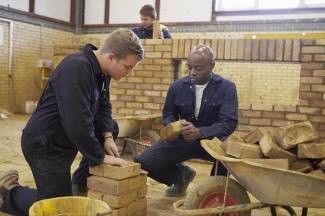
Original photo: (c)Monkey Business – stock.adobe.com
In contrast to the traditional full-time dual vocational education and training for crafts professions in the building sector, this new format will give access to dual vocational training for target groups which do not have the possibility to do a traditional full-time apprenticeship after secondary school but are changing careers to the building industry at a later time in their life.
Moreover, this new format facilitates the job market integration of the target groups described above, who are playing an increasingly important role on the job market as NEETs and other low-skilled workers, e.g. school dropouts or migrants.
The new dual training programme gives them the opportunity to build on their prior work experience yet benefit from the high quality of the German dual vocational education and training.
By applying for an external examination (Externenprüfung) by the Chamber of Skilled Crafts after having completed the qualification modules at level 3 (TQ3) and at level 5 (TQ5), they even get the opportunity to acquire fully recognised vocational qualification titles in the building industry.
On the basis of the lessons learned within the pilot phase, the Chamber of Skilled Crafts for Munich and Upper Bavaria will adjust the promotion strategy for the next dual training, which is foreseen for October 2021.
Learning Atelier: Design Thinking Workshops of Learning Practices and Processes in Dual Training (Trento/IT)
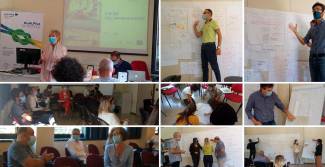
Original photo: (c)PAT
The programme, named "Learning Atelier", sees the participation of representatives of SMEs as well as educational institutions and an expert facilitator that guides a heterogeneous group of actors to identify issues/challenges useful for their professional development, to describe and share their strategies and competences and finally to integrate those strategies in order to produce a list of best practices to be suggested in the future. Furthermore, the programme considers the aspect of soft skills and ideally retraces the four main phases of educational activity: readiness to learn, learning design, motivation to learn and learning assessment.
Based on the Learning Atelier outcomes for the project DuALPlus, it was possible to identify a first family of strategies, considering the four strategic processes previously indicated.
Fit for the Future: Improving Dual Training (Bolzano/IT)

Original photo: (c)lvh
lvh-Education and Service cooperation has developed the concept "Fit for the Future", a workshop together with trainers and apprentices. The focus is on getting to know each other and clarifying open organisational questions. Together, trainers and trainees look at what is necessary to positively influence the training path, to master challenges and to take advantage of opportunities. In addition, all participants experience a sense of cohesion and mutual trust. The participants also learn about the use and importance of mental training and coaching.
These skills, coupled with reflection on one's own actions, contribute to strengthening social skills and support personal development. Through increased performance, communication and team skills, as well as appreciative mutual interaction, the culture of the entire company changes in the long term. At the same time, the attractiveness of the dual education system for crafts and trades in the Alpine region is strengthened and the networking of business, education and science can be experienced and felt.
The implementation of the "Fit for the Future" package was originally planned for April 2020. Due to the COVID-19 pandemic, the implementation had to be postponed to September 2021.
The Title Small Business Entrepreneur (Auvergne-Rhône-Alpes/FR)

Original photo: (c) CMAR ARA
The programme intends to respond to diverse target groups and their specific needs. First, young dropouts interested in reorienting their personal and professional project get access to a dual professional qualification on a technical and managerial level. Second, jobseekers and adults are offered retraining in management as part of the support of a project to create or take over a business. Other goals are to consolidate the training of craft assets, crafts(wo)men and apprentice spouses, to coordinate and energize partnerships with higher education institutions as well as to organize and promote the training offers of the Chambers of Trades and Crafts in the region.
The Small Business Entrepreneur designation is part of an action training scheme lasting up to one year. During this period, the participants will be immersed in their professional situation and will simultaneously attend the title training course. The training focuses of the operational management of creative, business development or recovery projects. The participants learn how to manage their projects as well as how to assess the skills needed for their projects.
A new session began in September 2020, with a limited number of participants. Due to the pandemic, training resources had to be adapted by developing tools for distance learning.
Apprentice Folder Digital (Bolzano/IT)
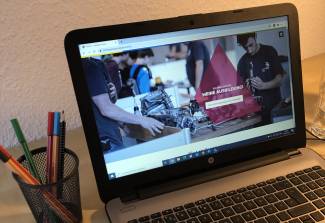
Original photo: (c)lvh
Lvh has developed the concept "Apprentice folder” and made it now digital. The “Apprentice folder” is mainly intended to serve as an instrument to train an apprentice in a structured way. Among other things, it contains the training plan and all important information concerning the work, e.g., hours, work clothes and work behaviour for the apprentice as well as for the employer.

